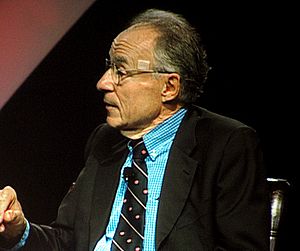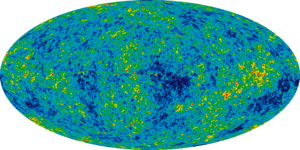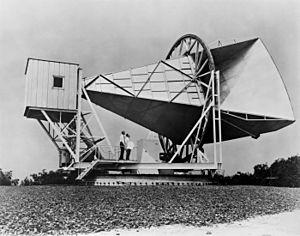Arno Allan Penzias facts for kids
Quick facts for kids
Arno Allan Penzias
|
|
|---|---|

Penzias in 2007
|
|
| Born | April 26, 1933 |
| Died | January 22, 2024 (aged 90) |
| Nationality | American |
| Alma mater |
|
| Known for | Cosmic microwave background radiation |
| Spouse(s) | Sherry Levit |
| Awards |
|
| Scientific career | |
| Fields | Physics |
| Institutions | |
| Physical cosmology | ||||||||||||||
 |
||||||||||||||
| Universe · Big Bang Age of the universe Timeline of the Big Bang Ultimate fate of the universe
|
||||||||||||||
Arno Allan Penzias (born April 26, 1933 – died January 22, 2024) was an American physicist and radio astronomer. He is famous for discovering the cosmic microwave background radiation (CMB). He made this discovery with Robert Woodrow Wilson. For their work, they shared the Nobel Prize in Physics in 1978.
Contents
Early Life and Education
Arno Penzias was born in Munich, Germany, in 1933. His parents, Justine and Karl Penzias, ran a leather business. When he was six, Arno and his brother Gunther were part of the Kindertransport. This was a rescue operation for Jewish children in Germany.
Later, his parents also left Germany for the United States. The family settled in New York City in 1940. In 1946, Penzias became an American citizen. He finished high school in 1951. He first studied chemistry at the City College of New York. But he soon changed his major to physics. He graduated in 1954, doing very well in his class.
After college, Penzias worked for two years in the U.S. Army. He was a radar officer. This experience led him to research at Columbia University. There, he worked with Charles Townes, who invented the maser. Penzias continued his studies at Columbia University. He earned his master's degree and then his PhD in physics in 1962.
Discovering the Cosmic Microwave Background

Arno Penzias began working at Bell Labs in New Jersey. There, he and Robert Woodrow Wilson worked on very sensitive equipment. This equipment was designed to pick up faint radio signals from space.
In 1964, they built a new, super-sensitive antenna system. They started hearing a strange radio noise. They couldn't explain it. This noise was much weaker than signals from our own Milky Way galaxy. It also seemed to come from everywhere in space. They thought it might be interference from Earth. They even checked if it was coming from New York City.
They also found that their large horn antenna was full of pigeon droppings. Penzias described it as "white dielectric material." They cleaned the antenna thoroughly. But the mysterious noise was still there.
After trying everything, Penzias contacted Robert Dicke, another scientist. Dicke suggested the noise might be a special kind of background radiation. This radiation had been predicted by some theories about the universe. It was thought to be a leftover glow from the very beginning of the universe.
Penzias and Wilson agreed to publish their findings. They wrote about their observations. Dicke then explained that this noise was the cosmic microwave background radiation (CMB). The CMB is like an echo from the Big Bang. This discovery was huge. It provided strong proof for the Big Bang theory. It confirmed ideas that scientists like Ralph Asher Alpher, Robert Herman, and George Gamow had suggested years earlier.
Personal Life
Arno Penzias lived in Highland Park, New Jersey, for many years. In 1996, he married Sherry Levit. He had three children: David, Mindy, and Shifra. He also had two stepchildren, Carson and Victoria.
Penzias passed away on January 22, 2024, at the age of 90. He died in San Francisco.
Honors and Awards
Arno Penzias received many awards for his important work.
- In 1975, he became a member of the American Academy of Arts and Sciences and the National Academy of Sciences.
- In 1978, Penzias and Wilson shared the Nobel Prize in Physics.
- In 1977, they received the Henry Draper Medal.
- In 1979, Penzias received the Golden Plate Award.
- He also received the Award of Excellence from The International Center in New York.
- In 1998, he was given the IRI Medal.
On April 26, 2019, a 3-meter radio telescope in Nuremberg, Germany, was named after Arno Penzias. This was done by the Nürnberger Astronomische Gesellschaft e.V. (NAG).
In 2023, the Radio Club of America announced a new award. It is called the "Dr. Arno A. Penzias Award for Contributions to Basic Research in the Radio Sciences." This award honors Penzias's work and aims to inspire future scientists.
See also
 In Spanish: Arno Allan Penzias para niños
In Spanish: Arno Allan Penzias para niños
- Discovery of cosmic microwave background radiation
- List of Jewish Nobel laureates

